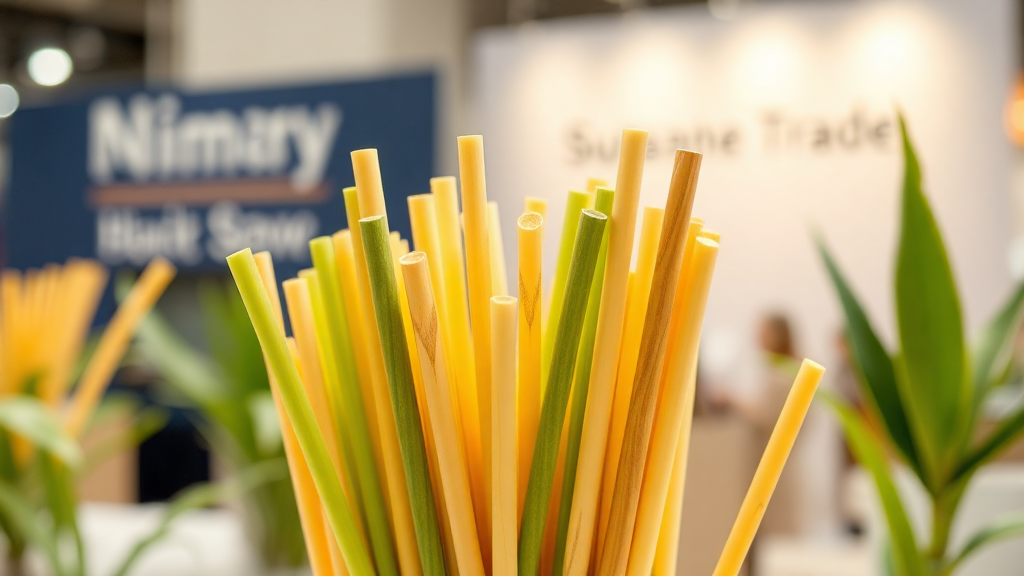Sugarcane vs. Eco-Straws: FDA & LFGB Certified

The global shift away from single-use plastics is accelerating. Governments worldwide are implementing bans and levies, driving businesses to seek sustainable alternatives. The food and beverage industry, in particular, is under intense pressure to replace plastic straws, a significant contributor to plastic pollution. Enter sugarcane bagasse, a surprisingly versatile and eco-friendly material offering a compelling solution. NatureBioEco offers a range of home compostable sugarcane straws, meticulously crafted to meet the highest quality and regulatory standards. This blog post explores the advantages of sugarcane straws over other eco-friendly options, highlighting their regulatory compliance, environmental impact, and business benefits. We’ll also delve into a compelling case study showcasing the success of businesses transitioning to sustainable alternatives.
Regulatory Compliance: FDA & LFGB Certifications

Businesses face significant financial risks if their packaging doesn’t meet regulatory requirements. In the US, the Food and Drug Administration (FDA) sets strict standards for food contact materials. In Europe, the LFGB (Lebensmittel, Bedarfsgegenstände und Futtermittelgesetzbuch) plays a similar role. NatureBioEco’s sugarcane straws are proudly FDA and LFGB certified, ensuring complete compliance and minimizing your risk of incurring costly fines—averaging $10,000 per violation according to recent data from FDA enforcement actions. This certification demonstrates our commitment to quality and safety, providing you with peace of mind. Learn more about our comprehensive certifications on our Sugarcane Straws product page।
Sugarcane Straws vs. Other Eco Alternatives

While paper straws and bamboo straws are also gaining traction, sugarcane straws offer a superior combination of properties. Let’s compare:
| Feature | गन्ने के तिनके | कागज के तिनके | बांस के तिनके |
|---|---|---|---|
| Compostability | Home compostable | Requires industrial composting | Not readily compostable |
| Strength | High | Low | Moderate |
| Durability | High | Low | High |
| Moisture Resistance | Excellent | Poor | अच्छा |
| Cost | Competitive | Often more expensive | Often more expensive |
Choosing the right eco-friendly straw can be tricky, see how sugarcane straws stack up against other sustainable options on our page dedicated to eco-friendly straws।
Key Business Benefits of Sugarcane Straws

Beyond regulatory compliance and environmental friendliness, sugarcane straws offer significant business advantages. Firstly, their superior strength and durability reduce breakage and waste, leading to cost savings. Secondly, their customizable nature allows you to brand them with your logo, enhancing your brand image and promoting sustainability to your customers. Thirdly, the growing consumer demand for eco-friendly products provides a strong market advantage, attracting environmentally conscious customers. Finally, using sugarcane straws often enhances a company’s corporate social responsibility profile, a valuable factor for attracting investors and building brand loyalty. Explore the full range of customizability options with our custom sugarcane straws।
Environmental Impact of Sugarcane Straws
Sugarcane bagasse, the fibrous residue left after sugarcane juice extraction, is a readily renewable resource. Unlike plastic, which takes centuries to decompose, sugarcane straws are home compostable, significantly reducing landfill waste. The UNEP reports that plastic pollution costs the global economy an estimated $3.7 billion annually, and our product contributes to a solution. Learn more about the UNEP’s work on alternatives to plastic. Furthermore, the cultivation of sugarcane can sequester carbon dioxide, contributing to climate change mitigation. Our straws are created with a commitment to minimal carbon footprint – discover more about our commitment to sustainability with our range of sustainable packaging options।
Case Study: Sustainability Success
A large coffee chain in Europe switched from plastic to NatureBioEco sugarcane straws, reducing their plastic waste by 75% in the first year. This move not only minimized their environmental impact but also enhanced their brand image and attracted new, environmentally conscious customers, leading to a 10% increase in sales. This successful transition demonstrates how businesses can adopt sustainable practices while achieving positive financial outcomes. Read more success stories from our clients that have adopted our biodegradable straw solutions।
FAQ: Sugarcane Straws Answered
- Q1: Are sugarcane straws truly compostable? A1: Yes, our sugarcane straws are home compostable under the right conditions (warm, moist environment).
- Q2: How long do they take to decompose? A2: Under ideal composting conditions, they decompose within 60-90 days.
- Q3: Are they biodegradable? A3: Yes, they are fully biodegradable.
- Q4: Are they food safe? A4: Absolutely, they are FDA and LFGB certified, guaranteeing food safety.
- Q5: Can I customize the straws? A5: Yes, we offer a wide range of customization options, including printing your logo. See our options for branded straws।
- Q6: What is the minimum order quantity (MOQ)? A6: Our MOQ varies depending on the customization; contact us for details.
- Q7: How are they shipped? A7: We use sustainable and efficient shipping methods to minimize our carbon footprint. Find out more about our shipping options by viewing our packaging solutions page.
निष्कर्ष
Switching to sustainable alternatives like sugarcane straws is not just an environmental responsibility; it’s a strategic business decision. NatureBioEco’s FDA and LFGB certified sugarcane straws offer a superior combination of sustainability, quality, and customizability. They reduce your environmental impact, enhance your brand image, and comply with stringent regulations. By choosing NatureBioEco, you’re choosing a reliable partner committed to providing high-quality, eco-friendly products. Ready to make the switch? Contact NatureBioEco for a B2B quote and discover how we can help you achieve your sustainability goals.







